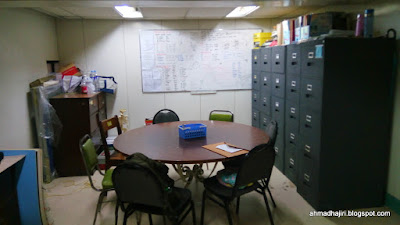Clerkship Day 204 to 216: Rehabilitation Medicine
Continuing on our ever-delayed
journal on “How to survive Clerkship in UP-PGH” (I made up that book title),
let us talk about the things to know about clerkship in Rehab Medicine.
General Info (What you need to know):
Duration of Rotation:
|
2 weeks
|
Number of students:
|
8 (sub-block)
|
Important hours:
|
Time in: 7:30 AM (They’re strict on this!)
Time out: 4:30 PM (Yup! It’s that early)
But students preparing for the G rounds the next
day will usually stay until 8 to 9PM.
|
Wearing uniforms
|
REQUIRED!
|
Duties:
|
At least once a week for each student. 2 students
will have only 1 duty for the whole rotation.
Weekdays: 5PM to 7AM the next day
Weekends: 8AM to 8AM the next day
No true posts. Post-duties to stay until 4:30PM
except weekends.
|
SIC work:
|
At most 2 patients each student, with one “G”
patient each.
|
With interns?
|
Yes, but only during night duties. They have OPDs
during the day and all patients in the ward are handled by the clerks. Learn
more on Ward Duties.
|
Residents
|
Some are toxic especially during “G” rounds but
most of them are really kind and approachable. They will really teach you if you
show interest to learn something. High yield mentoring.
|
Call room
|
Yes. Pretty decent, good airconditioning, enough
chairs but no beds -_-
Two restrooms just outside the call-room. Clean
and well-maintained.
Wi-Fi connection is moderate. I recommend
bringing your own LTEs.
|
What’s unique?
|
·
The “G” rounds, once a week.
·
You have to attend the PT and OT sessions of
your patients every day. Don’t forget to take videos of their sessions! You
will show this to your RICs.
·
There are three different charts: Orders chart
(the regular chart), the PT/OT Charts and the White chart for SIC clerks.
·
SIC clerks have separate charts (the “White
chart”) to input your SIC notes and progress notes.
|
What to watch out for:
|
The “G” Rounds. Learn more about it below.
|
Required Paper works:
|
·
Index card/attendance
·
Patient log and endorsement sheets
·
Reflection paper
·
SIC notes (handwritten!) 24 hours after receiving
the patient.
·
Updated Progress notes of your patients every
Friday
·
Outgoing notes by the last Sunday of your
rotation
|
Other activities
|
·
4 SGDs
|
Toxicity level
|
6/10
It’s actually chill
|
|
|
I think I have tackled most of
the important things above. I will just then give more details on some points.
The Ward Duty
Update: Starting April 2016 (our
rotation) ER Duties are no longer required. So YEAYY!!!
There are only 16 beds in Rehab Ward which is the "deeper" half of Ward 5 (the other half occupied by Neurology). Each clerk is assigned with 2 patients each.
The Ward duty begins at 4:30 PM
and ends by 7AM the next day during weekdays. On weekends when most students
are free, the duty team are expected to be in Rehab Ward from 8AM to 8AM the
next day. Students on duty (one clerk and one intern) will be in-charge of
conducting chart rounds on all patient and carry out all orders during their
duty. There are minimal procs (blood extractions) and they are usually done by
the non-duty SICs during the day unless they are time-bound. Conducting to
Radio for XRays, UTZ, MRIs are rare. There are usually no monitoring unless
there’s a toxic patient (usually only one in a week). You can basically take
turns monitoring and have enough time to sleep in the call room and wake up at
around 5AM to carry out any procs.
Each duty student is required to
present and endorse a new case (usually referrals) to the Senior resident on
duty the next day. It’s a one-on-one teaching endorsement, so it’s cool and you
will learn a lot :) Just be sure to inform your resident ahead of time so that
he/she will be able to schedule a meeting with you.
What to bring? The usual PE
Stuff: BP App (sphygmomanometer), a thermometer, your pulse oximeter and
stethoscopes are often enough. Bring a laptop and lots of movies if you feel
like watching any, or your unfinished books to read. This is perhaps one of the
best duties to spend those.
 |
| The callroom with the round table. It also serves as the "Research Room" so a lot of journals and research papers are "kept" here. |
 |
| Don't forget to write your name and your contact number on the white board located at the nurse station whenever you're on duty! |
 |
| The entrance door to the PT and OT Gyms. It's supposed to be locked during the night. Ask the ROD for the keys. |
 |
| The hallway of the Mezzanine going from the callroom. |
The SGDs
There will be four sets of SGDs: Neuro,
Burn, Spine and Pedia. We were told that Neuro SGD would be done bedside, but
we prepared Powerpoint presentations to all of them anyway. It turned out we
could use the PPTs in all SGDs. The division of labor would depend on how your
group (esp your LO) would agree upon. What we did was assign 2 students for
each SGD who will take care of getting the History and PE and acquiring copies
of the chart and lab results. Ideally, those who will not be in G rounds on
that week will be the ones to be in-charge of the Hx and PE. We had a flexible
assignment of tasks though because there was a sudden change in our sched so we
swapped roles along the way.
The SGDs are quite toxic. Sometimes
the case will be given to you 2 days before the SGD and there are patients that
are not in Ward 5 (Burn and Pedia patients particularly). Everyone must know
the case: as it should be, but let’s face it, we usually end up dividing the
task and focusing on thing only. The consultants are particularly keen on Hx
and PE and not much on pathophysio and management but most of them are quite
forgiving if you failed to do one or two tests. One of them is pretty notorious
for grilling students during SGDs but he/she teaches well. Always be prepared
and read up on your patients’ case days before the SGDs. Never appear sleepy
during SGDs or you will end up getting the attention of your consultant!!
Always be sure to have your Resident monitor check your presentation the day
before your SGDs, their tips and suggestions are really helpful.
 |
| Rehab Clerks preparing for the SGDs |
 |
| While waiting for our preceptor, we had enough time to fool around ^_^ |
The “G” Rounds
Once a week, the dreaded “G”
rounds would swamp and wreak havoc to the ever-peaceful Rehab Ward. It is the
longest 4 hours of a clerks’ life in Rehab Medicine. The “G” stands for the
surname of the well-known (and most feared) consultant in Rehab Medicine in
PGH. Everyone knows her. And everyone knows that you should never, ever face
her during G rounds unprepared. And worst, it’s GRADED! (-_-)
Each student will be assigned one
G patient (they are from beds 1 to 8) and each week, 4 students will be “sacrificed”
to present to her their assigned case during the G rounds. The students are
expected to know everything about the patient assigned to him/her especially
the History, the pertinent Physical examination findings and the course in the
ward. Knowing by heart the patients’ condition (from pthophysio to treatment
options) and the service’s management goals is a bonus.
Reading scripts or your patients’
records are not allowed. You are required to memorize everything and report to
her right then and there. It’s OK to glance on your script if you miss
something, but more often than not, looking at your notes is a big no-no. You
must always appear interested but never, ever laugh or even smile! We were told
that that is something she never liked students doing during her rounds. She
would often ask questions in the middle of everything and you must answer that
question to move on. If you cannot answer it, she will turn the questions to
your fellow clerks/students. And if all else fail, the Residents will be there
to save you (or get drowned with you). Your RIC will surely help you prepare
for G rounds. They will ask you to prepare your script and practice with them
days before your G rounds, so always follow what they ask you to do. They are
your greatest comrades in this battle.
Academically, the G-rounds are
actually one of the best opportunities to learn about your patients’ condition.
There are things that you and your RIC might have missed that would certainly
come out during G rounds. Just the mere “fear” of failing would push you beyond
your usual self, to read on about your patients’ case. And you will never
forget those that you learned in G rounds ever again (after experiencing the
stress of course!). But fret not! If you have prepared well days before it, you
will surely survive the G rounds without a smile!
 |
| There's this kiddie park fronting the entrance to the PT/OT gym. This is where I practiced my script for the G rounds. I kept repeating my script while walking around here. I think I made around 8 laps tops. |
 |
| Before the G Storm: Trying to stay sane while refining our scripts for the G rounds |
 |
| After the storm: The first four "tributes" to the G Rounds. Survived without smiling! |
Readings/References:
Not required but good-to-have. Really
useful during SGDs and G rounds.
ENJOY REHAB!
I think that’s all for Rehab Med.
One last tip on how to maximize your stay in Rehab:
Talk and spend time with your
patients :) As you will have at most two patients only, you will have enough
time to know them more. I only had two patients during my whole stay in Rehab
Medicine and their stories are always worth listening and looking back into.
You can read about them here: "
Disabled" and "A blessing".
Hope this mini-guide would help
those who will enter clerkship in Rehab Medicine in the future. I now these
things often change every now and then, but most of them are the same. If you
think I missed anything, lease do inform me so that I can edit this post. You can
easily contact me thru my FB Page:
AhmadHajiri.
Thank you for reading and
Maasalaam! (with Peace!)
-Ahmad ibn Hajiri













Comments